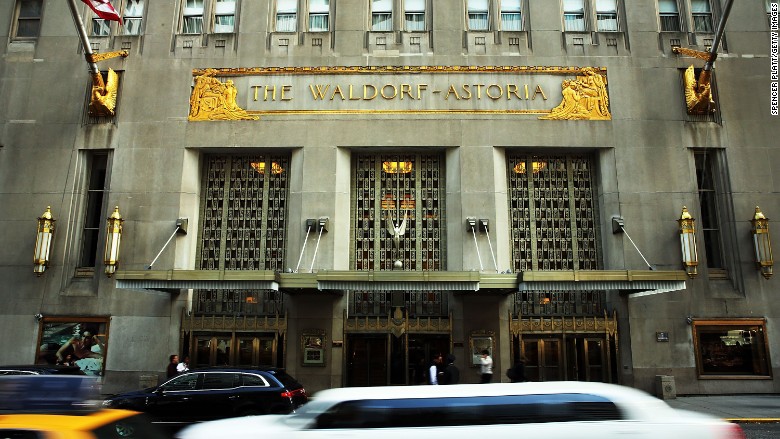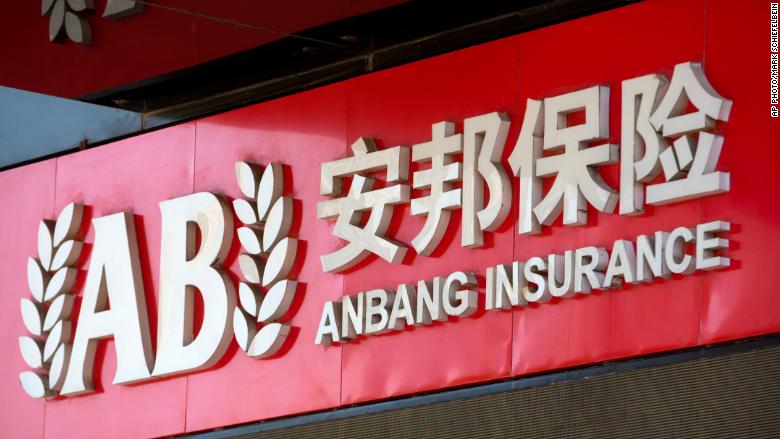
The Chinese government has seized control of a deal-hungry insurance firm that owns major assets in the U.S. including the Waldorf Astoria, and is prosecuting the company's chairman.
China's insurance regulator said Friday that it had taken control of Anbang Insurance for one year. The Chinese firm is best known for its ambitious deal-making efforts overseas, including the $1.95 billion purchase of the Waldorf Astoria, a failed $14 billion bid for the Starwood hotel chain, and unsuccessful talks with the Kushner family business over a Manhattan office tower.
The China Insurance Regulatory Commission said in a series of statements that Anbang Chairman Wu Xiaohui has been removed from his post and is being prosecuted for "economic crimes."
A statement from Shanghai prosecutors carried by Chinese state media said Wu had been indicted for fraudulent fund-raising and improperly taking company assets.
The insurance regulator said the decision to put Anbang under government control was because of "illegal management and operation activities" that could "endanger" its ability to stay in business. It didn't specify what those activities were.
The crackdown on the company follows an investigation that has been running since June, according to the statement. That's when Wu was reported to have been detained by authorities.
Related: China has a worrying habit of making business leaders disappear
Spokespeople for Anbang didn't respond to requests for comment Friday.
The regulator said that the company's operations remain "stable" and that it will remain a private company. The temporary takeover of its operations is in order to protect the interests of consumers and the wider public, it said.
Anbang has drawn global attention in recent years for its aggressive pursuit of assets around the world.

The company was founded in 2004 as a provincial car insurer but has since ballooned into a global giant. In recent years, it snapped up businesses including life insurers in the Netherlands and South Korea, a Belgian bank and luxury hotels.
Anbang has spent more than $20 billion on deals since 2014, according to data from research firm Dealogic.
Related: Kushner company, Chinese firm call off development deal
China's insurance regulator may now seek to sell off a lot of the businesses Anbang bought, according to Brock Silvers, managing director of Shanghai-based investment firm Kaiyuan Capital.
He said the Chinese government's move is "fairly rational" given the concerns about Anbang's business model.
Much of the insurer's aggressive deal-making was funded by selling insurance plans that promised big returns to consumers, rather than than through bank loans or the bond market, according to Silvers. That would leave regular Chinese citizens' money at risk if Anbang ran into real financial trouble, an unappealing prospect for China's ruling Communist Party.
Other major Chinese deal-makers have come under increased pressure from authorities over the past year.
Billionaire Wang Jianlin's Dalian Wanda Group made headlines buying up entertainment, sports and real estate assets around the world, including a Hollywood studio and part of a top Spanish soccer team. But Wang is much more focused on offloading parts of his global empire these days.
Related: Billionaire Wang Jianlin is selling off his global empire
HNA Group, which owns stakes in Deutsche Bank (DB) and Hilton Worldwide (HLT), has also reversed its own global shopping spree in recent months amid questions over its debt burden and ownership structure.
The Chinese government stepped up scrutiny last year of large companies that had borrowed heavily to fund buying binges overseas.
Experts said Chinese leaders were worried about risks to the country's financial system from the debts the companies were running up and the flood of money that had been pouring out of the country.
Anbang has attracted plenty of controversy outside of China, too. Members of the U.S. Congress have previously raised concerns about the opaque insurer's ties to the Chinese government.
Besides the Waldorf Astoria, its U.S. purchases include the multibillion-dollar acquisition of Strategic Hotels & Resorts from private equity giant Blackstone in 2016. But even that wasn't straightforward: the deal excluded a hotel near San Diego that U.S. officials decided was too close to a military base to be sold to a Chinese buyer.
-- Nanlin Fang contributed to this report.

